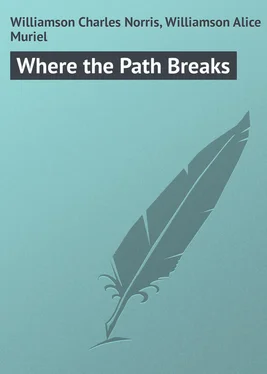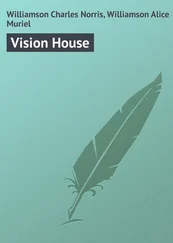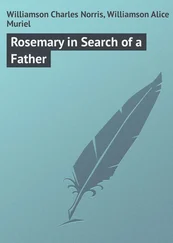Charles Williamson - Where the Path Breaks
Здесь есть возможность читать онлайн «Charles Williamson - Where the Path Breaks» — ознакомительный отрывок электронной книги совершенно бесплатно, а после прочтения отрывка купить полную версию. В некоторых случаях можно слушать аудио, скачать через торрент в формате fb2 и присутствует краткое содержание. Жанр: foreign_prose, на английском языке. Описание произведения, (предисловие) а так же отзывы посетителей доступны на портале библиотеки ЛибКат.
- Название:Where the Path Breaks
- Автор:
- Жанр:
- Год:неизвестен
- ISBN:нет данных
- Рейтинг книги:5 / 5. Голосов: 1
-
Избранное:Добавить в избранное
- Отзывы:
-
Ваша оценка:
- 100
- 1
- 2
- 3
- 4
- 5
Where the Path Breaks: краткое содержание, описание и аннотация
Предлагаем к чтению аннотацию, описание, краткое содержание или предисловие (зависит от того, что написал сам автор книги «Where the Path Breaks»). Если вы не нашли необходимую информацию о книге — напишите в комментариях, мы постараемся отыскать её.
Where the Path Breaks — читать онлайн ознакомительный отрывок
Ниже представлен текст книги, разбитый по страницам. Система сохранения места последней прочитанной страницы, позволяет с удобством читать онлайн бесплатно книгу «Where the Path Breaks», без необходимости каждый раз заново искать на чём Вы остановились. Поставьте закладку, и сможете в любой момент перейти на страницу, на которой закончили чтение.
Интервал:
Закладка:
Denin had dashed down a title on the first page of his manuscript before beginning the book. There had seemed to him only one name for it: “The War Wedding.” Now that he came to read it all over, he still had the feeling that something in him more powerful than himself had done the writing; and suddenly he began to wish intensely that Barbara might see the testament of his heart.
He wished this not because he was proud of his work, or thought it superlatively good, but because he hoped that it might comfort her. She had been strangely reserved with him, invariably baffling, almost mysterious, during the latter half of their acquaintance, yet he had felt that he knew the truth of her nature, deep down under the girlish concealments. He had believed her tender-hearted. If she had not been so, why had she married him? And he thought that a girl of her strong character and sensitive spirit might be stabbed with remorse sometimes after gathering the flower of happiness for herself so near a new-made grave. He could not bear to think that Barbara might torture her conscience for his sake. He wanted her to be happy, wanted it more than anything else now. Not that he was naturally a marvel of unselfishness, but that he loved Barbara Fay better than he had ever loved himself. If this story which he had written – like, yet unlike, her own story – should happen to fall into Barbara’s hands, she might find consolation through all the coming years, because of certain thoughts from the man’s point of view, thoughts that would almost surely be new to her. And what joy for Denin, even lying in the gulf of forgetfulness, if his hand could reach out from the shadows to give her a thornless white rose of peace!
He wondered eagerly if he could find a publisher in New York – a publisher who produced books in England as well as America – to accept his manuscript.
Now that the wish was born, it seemed too good to be true that anything could come of it. Still, he determined to try, and try at once. Full of excitement he went out into a noisy street, and bought several newspapers and magazines. There were a number of publishers’ advertisements in them all, some with familiar names, but one he had known ever since he was old enough to read books. It was a name of importance in the publishing world, but there was no harm in aiming high. He had brought the manuscript out with him, because he could not bear to leave it alone in a strange house. Now he decided to take the parcel to the publisher himself. Nothing would have induced him to trust it to the post.
CHAPTER V
Four-thirty in the afternoon was Eversedge Sibley’s hour for leaving his office. If he had cared about escaping earlier he could easily have got away, for since his father’s death he stood at the head of the old publishing house; but to him business was the romance, poetry, and adventure of life. He passionately loved the champ and roar of the printing-presses as many people love a Wagner opera. There were never two days alike. Something new was always happening. Yet just because he was young for his “job,” and knew that he was a man of moods and temperament, he forced himself to be bound by certain rules. One of these rules was, even if he chose to linger a few minutes after four-thirty, that no caller need hope to be admitted. That was a favorite regulation of Sibley’s. It made him feel that, after all, he was very methodical. One afternoon, however, he did a worse thing than break this rule. He went back from the elevator, the whole length of the corridor to the outer office, simply to enquire about a man he had met at the lift door.
They almost collided as the man was stepping out and as Sibley was about to step in. But he did not step in. He let the lift shoot down without him, while he paused to stare after the man.
“Strange-looking customer!” he thought.
Sibley himself was a particularly immaculate person. Being somewhat of the Latin type, black eyed and olive skinned, he was shamefacedly afraid of looking picturesque. He dressed, therefore, as precisely as a fashion-plate. The man who had got out of the lift might have bought his clothes at a junk-shop, and a foreign junk-shop at that. They were not clothes a gentleman could wear – yet Sibley received a swift impression that a gentleman was wearing them at that moment: a remarkably tall fellow, so thin that his bones looked somehow too big for him.
He walked past Sibley with no more than a glance, yet it was partly the glance which impelled Sibley to stop short and gaze at the back of a badly made tweed coat, the worst sort of a “reach-me-down” coat.
The quick mind of the publisher was addicted to similes. (He had once written a book himself, under a nom de guerre . It had failed.) The thought sprang to his mind that the glance was like the sudden opening of a dingy box, which let out a flash of secret jewels.
In spite of his shocking clothes, the man had the air and bearing of a soldier. Sibley noticed this, in criticizing the straight back, and it aroused his curiosity more than ever in connection with the scarred face.
Any one who got out at the tenth floor of the Sibley building must want to see Eversedge Sibley or one of his partners, so evidently this person intended to ask for some member of the firm. He looked the last man on earth to be a budding author; yet Eversedge Sibley had caught sight of a paper-wrapped roll of manuscript. One who was not of the publishing or editorial world might have mistaken it for something else; but no manuscript would disguise itself from eyes so trained to fear and avoid it.
“Looks more like a heavy-weight champion invalided after a desperate scrap, than a writer; or like Samson betrayed by Delilah,” thought Sibley, rather pleased with the fancy.
He put out his hand to touch the bell for the lift to come up again, but did not touch it. Instead, he turned and walked back along the marble-walled corridor to the door of the reception room. The tall man had just arrived and was talking to a wisp of a creature facetiously known in the office as “the chucker out.”
“Mr. Sibley has gone, sir,” little McNutt was insisting, with dignity. “He doesn’t generally receive strangers. Mr. Elliot is in, though, and might see you if you could wait – ”
As he spoke, McNutt caught sight of his “boss” at the door, and by looking up a pair of thick gray eyebrows, he made a distressful signal of warning. It would be awkward for Mr. Sibley to be trapped and buttonholed here, just as he had been officially described as out. McNutt could not remember the boss ever coming back after he had gone for the day, and appearing in the publicity of the reception room. If he had forgotten something, why didn’t he let himself in at the door of his own private office, which was only a little further along the hall? But, there he was, and must be protected.
“Who is Mr. Elliot?” enquired the stranger.
Eversedge Sibley spent a short holiday in England every summer, and knew that the vilely dressed man had the accent of the British upper classes. His curiosity grew with what it fed on.
“Mr. Elliot is the third partner in the firm,” explained McNutt, to whom such ignorance appeared disgraceful.
“Thank you, I’d rather wait until to-morrow and try to see Mr. Sibley himself,” said Denin.
“I am Mr. Sibley,” the publisher confessed, on one of his irresistible impulses. “I’ve just come back for something forgotten. I can give you a few minutes if you like.”
The man’s face lit. It could never have been anything but plain, almost ugly, even before the scars came; yet it was singularly arresting. “That’s very good of you,” he said.
Sibley ushered the odd visitor into his own private office, but before he could even be invited to sit down, Denin got to his errand.
Читать дальшеИнтервал:
Закладка:
Похожие книги на «Where the Path Breaks»
Представляем Вашему вниманию похожие книги на «Where the Path Breaks» списком для выбора. Мы отобрали схожую по названию и смыслу литературу в надежде предоставить читателям больше вариантов отыскать новые, интересные, ещё непрочитанные произведения.
Обсуждение, отзывы о книге «Where the Path Breaks» и просто собственные мнения читателей. Оставьте ваши комментарии, напишите, что Вы думаете о произведении, его смысле или главных героях. Укажите что конкретно понравилось, а что нет, и почему Вы так считаете.











